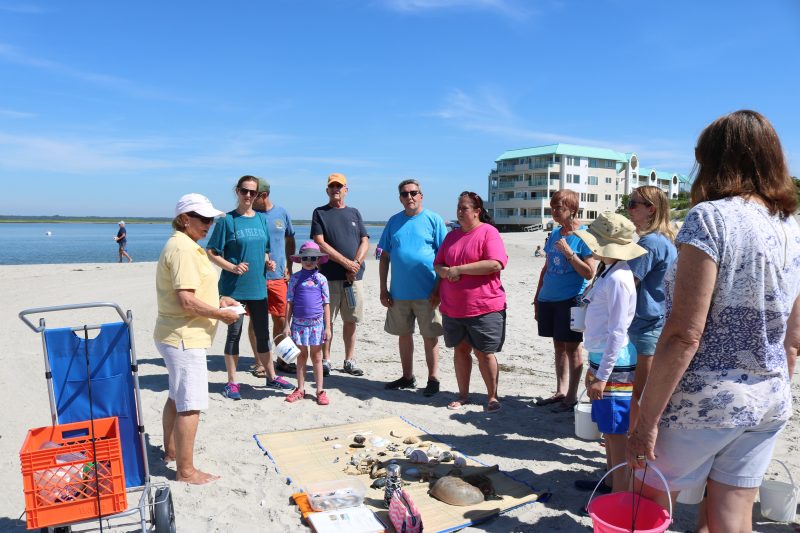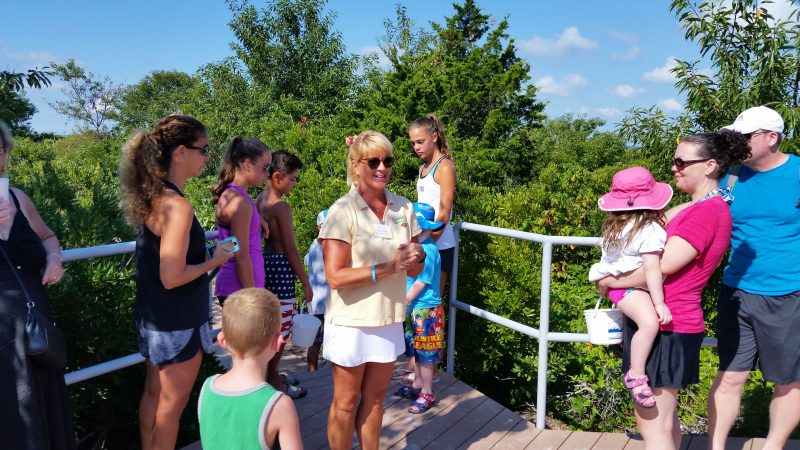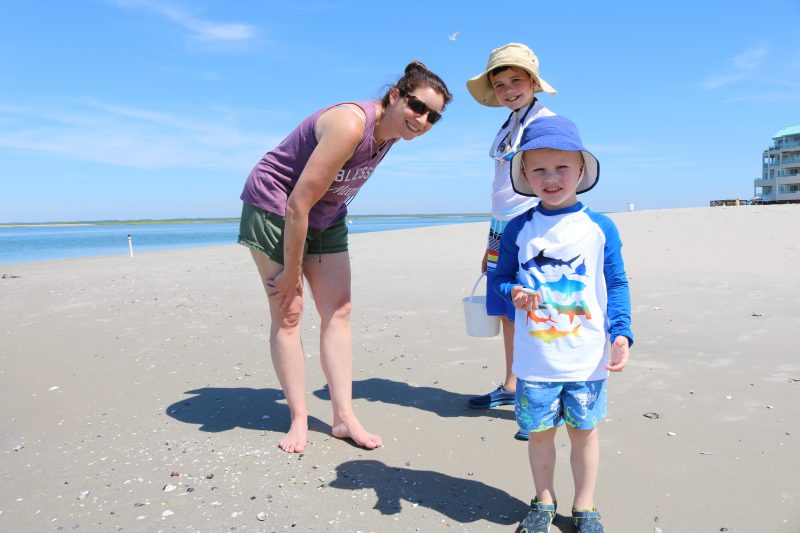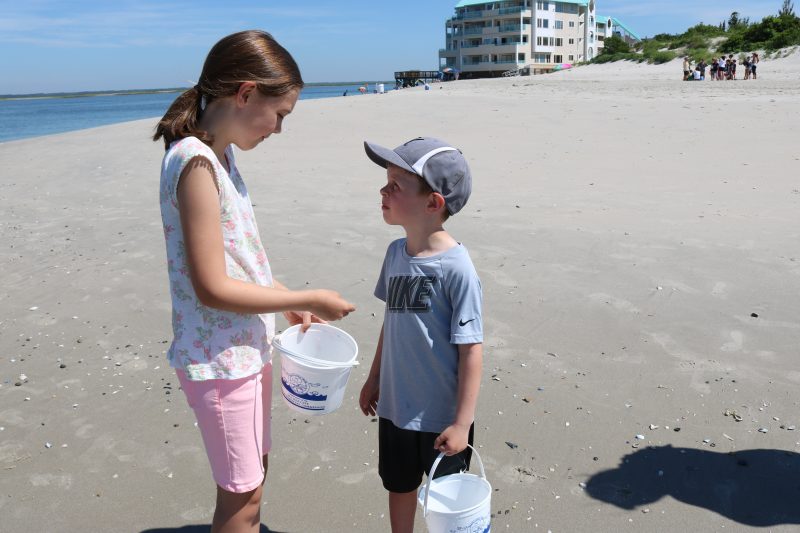 By DONALD WITTKOWSKI
For more than 30 years, the Sea Isle City Environmental Commission has been teaching children about the Jersey Shore’s diverse ecosystem and marine life by hosting family-friendly beachcombing tours that combine fun with education.
However, this summer there are plans to scale back the popular public tours from twice a week to only once a week and to hold them at only one location instead of two.
Already, the tours have been delayed by the coronavirus shutdown across the state. As the coronavirus restrictions are loosened and the state begins to emerge from the pandemic, there is hope the tours can resume on July 7 and continue until Sept. 1.
This summer marks the 32nd year of beachcombing in Sea Isle. It is estimated that more than 50,000 beachcombers have taken the tours over the years.
“I think it’s been a highlight for a lot of families that vacation here and for the local residents who bring their children and grandchildren. It’s just a tradition for families,” said Abby Powell, who has served as beachcombing co-chairwoman.
By DONALD WITTKOWSKI
For more than 30 years, the Sea Isle City Environmental Commission has been teaching children about the Jersey Shore’s diverse ecosystem and marine life by hosting family-friendly beachcombing tours that combine fun with education.
However, this summer there are plans to scale back the popular public tours from twice a week to only once a week and to hold them at only one location instead of two.
Already, the tours have been delayed by the coronavirus shutdown across the state. As the coronavirus restrictions are loosened and the state begins to emerge from the pandemic, there is hope the tours can resume on July 7 and continue until Sept. 1.
This summer marks the 32nd year of beachcombing in Sea Isle. It is estimated that more than 50,000 beachcombers have taken the tours over the years.
“I think it’s been a highlight for a lot of families that vacation here and for the local residents who bring their children and grandchildren. It’s just a tradition for families,” said Abby Powell, who has served as beachcombing co-chairwoman.

Abby Powell, center, who has served as co-chair of the beachcombing program, says tours will probably be held only once a week this summer.
Tours are usually held twice a week from 10 a.m. to 11 a.m. On Tuesdays, they take place at 29th Street and the Promenade. On Thursdays, they would be held at the Townsends Inlet Waterfront Park at 94th Street.
However, sand erosion that caused a steep drop-off in the dunes leading to the beach at Townsends Inlet has led to the decision that it is not safe enough to hold the tours there on Thursdays this summer, Powell explained.
“The path that goes to the beach is totally eroded,” she said. “It’s not safe. At high tide, water is all the way up to the dunes.”
Powell noted that it appears Mother Nature “took a knife” and sliced away the dunes.
For the time being, plans call for holding the tours only once a week, on Tuesdays, at the 29th Street beach. Powell said there is a possibility that a Thursday tour might be added at 29th Street.

Beachcomber Jen Napier, of Philadelphia, with her sons, Jacob, 4, and 10-year-old Benjamin at the start of their treasure hunt in 2019.
Social distancing guidelines will lead to other changes with the tours. Tour guides and the beachcombers will have to maintain a safe distance from each other, Powell said.
“We’re not going to be taking anyone’s temperature or anything like that. But we’ll make sure that we’ll be social distancing,” she said.
Surgical masks or face coverings will not be required, although beachcombers would be free to wear them if they choose to, Powell said.
She noted that there should be plenty of space on the beach to practice social distancing without having to wear a mask. She also said that it would be difficult for the guides to talk while conducting the tours if they would have to wear masks.
For only a $1 donation, beachcombers learn all about seashells, marine life, the ocean, the bays, the beaches and more from the guides, who are members of the Environmental Commission. The tours include shell-hunting excursions that allow children to dig in the sand like modern-day pirates searching for buried treasure.
To illustrate their remarks, the tour guides use an assortment of shells, crabs, fake turtles and other sea life spread out on a towel on the sand. Normally, the marine life samples are passed around for families to touch, but this summer that will not happen to prevent the possible spread of the coronavirus, Powell said.

Holding their shell-collecting buckets, Claire Nestor, 7, of Lock Haven, Pa., and her brother, Michael, 5, look for some keepsakes in 2019.
Children taking the tours are given some environmentally themed goodies, including shell-collecting plastic buckets. They also receive a beachcomber bracelet, a coloring book decorated with marine life and a certificate proclaiming them as stewards of the environment.
In previous years, the children were given their buckets before the tours began and their bracelets and coloring books afterward. This summer, everything will be handed out before the tours start to limit exposure between the guides and beachcombers, Powell said.
Powell stressed the importance of resuming the beachcombing tours after all the sacrifices children have had to make during the coronavirus shutdown.
“We feel that so much has been taken from the kids. This is something they can do safely,” she said.
 By DONALD WITTKOWSKI
For more than 30 years, the Sea Isle City Environmental Commission has been teaching children about the Jersey Shore’s diverse ecosystem and marine life by hosting family-friendly beachcombing tours that combine fun with education.
However, this summer there are plans to scale back the popular public tours from twice a week to only once a week and to hold them at only one location instead of two.
Already, the tours have been delayed by the coronavirus shutdown across the state. As the coronavirus restrictions are loosened and the state begins to emerge from the pandemic, there is hope the tours can resume on July 7 and continue until Sept. 1.
This summer marks the 32nd year of beachcombing in Sea Isle. It is estimated that more than 50,000 beachcombers have taken the tours over the years.
“I think it’s been a highlight for a lot of families that vacation here and for the local residents who bring their children and grandchildren. It’s just a tradition for families,” said Abby Powell, who has served as beachcombing co-chairwoman.
By DONALD WITTKOWSKI
For more than 30 years, the Sea Isle City Environmental Commission has been teaching children about the Jersey Shore’s diverse ecosystem and marine life by hosting family-friendly beachcombing tours that combine fun with education.
However, this summer there are plans to scale back the popular public tours from twice a week to only once a week and to hold them at only one location instead of two.
Already, the tours have been delayed by the coronavirus shutdown across the state. As the coronavirus restrictions are loosened and the state begins to emerge from the pandemic, there is hope the tours can resume on July 7 and continue until Sept. 1.
This summer marks the 32nd year of beachcombing in Sea Isle. It is estimated that more than 50,000 beachcombers have taken the tours over the years.
“I think it’s been a highlight for a lot of families that vacation here and for the local residents who bring their children and grandchildren. It’s just a tradition for families,” said Abby Powell, who has served as beachcombing co-chairwoman.
 Abby Powell, center, who has served as co-chair of the beachcombing program, says tours will probably be held only once a week this summer.
Tours are usually held twice a week from 10 a.m. to 11 a.m. On Tuesdays, they take place at 29th Street and the Promenade. On Thursdays, they would be held at the Townsends Inlet Waterfront Park at 94th Street.
However, sand erosion that caused a steep drop-off in the dunes leading to the beach at Townsends Inlet has led to the decision that it is not safe enough to hold the tours there on Thursdays this summer, Powell explained.
“The path that goes to the beach is totally eroded,” she said. “It’s not safe. At high tide, water is all the way up to the dunes.”
Powell noted that it appears Mother Nature “took a knife” and sliced away the dunes.
Abby Powell, center, who has served as co-chair of the beachcombing program, says tours will probably be held only once a week this summer.
Tours are usually held twice a week from 10 a.m. to 11 a.m. On Tuesdays, they take place at 29th Street and the Promenade. On Thursdays, they would be held at the Townsends Inlet Waterfront Park at 94th Street.
However, sand erosion that caused a steep drop-off in the dunes leading to the beach at Townsends Inlet has led to the decision that it is not safe enough to hold the tours there on Thursdays this summer, Powell explained.
“The path that goes to the beach is totally eroded,” she said. “It’s not safe. At high tide, water is all the way up to the dunes.”
Powell noted that it appears Mother Nature “took a knife” and sliced away the dunes.
 Beachcomber Jen Napier, of Philadelphia, with her sons, Jacob, 4, and 10-year-old Benjamin at the start of their treasure hunt in 2019.
Social distancing guidelines will lead to other changes with the tours. Tour guides and the beachcombers will have to maintain a safe distance from each other, Powell said.
“We’re not going to be taking anyone’s temperature or anything like that. But we’ll make sure that we’ll be social distancing,” she said.
Surgical masks or face coverings will not be required, although beachcombers would be free to wear them if they choose to, Powell said.
She noted that there should be plenty of space on the beach to practice social distancing without having to wear a mask. She also said that it would be difficult for the guides to talk while conducting the tours if they would have to wear masks.
For only a $1 donation, beachcombers learn all about seashells, marine life, the ocean, the bays, the beaches and more from the guides, who are members of the Environmental Commission. The tours include shell-hunting excursions that allow children to dig in the sand like modern-day pirates searching for buried treasure.
To illustrate their remarks, the tour guides use an assortment of shells, crabs, fake turtles and other sea life spread out on a towel on the sand. Normally, the marine life samples are passed around for families to touch, but this summer that will not happen to prevent the possible spread of the coronavirus, Powell said.
Beachcomber Jen Napier, of Philadelphia, with her sons, Jacob, 4, and 10-year-old Benjamin at the start of their treasure hunt in 2019.
Social distancing guidelines will lead to other changes with the tours. Tour guides and the beachcombers will have to maintain a safe distance from each other, Powell said.
“We’re not going to be taking anyone’s temperature or anything like that. But we’ll make sure that we’ll be social distancing,” she said.
Surgical masks or face coverings will not be required, although beachcombers would be free to wear them if they choose to, Powell said.
She noted that there should be plenty of space on the beach to practice social distancing without having to wear a mask. She also said that it would be difficult for the guides to talk while conducting the tours if they would have to wear masks.
For only a $1 donation, beachcombers learn all about seashells, marine life, the ocean, the bays, the beaches and more from the guides, who are members of the Environmental Commission. The tours include shell-hunting excursions that allow children to dig in the sand like modern-day pirates searching for buried treasure.
To illustrate their remarks, the tour guides use an assortment of shells, crabs, fake turtles and other sea life spread out on a towel on the sand. Normally, the marine life samples are passed around for families to touch, but this summer that will not happen to prevent the possible spread of the coronavirus, Powell said.
 Holding their shell-collecting buckets, Claire Nestor, 7, of Lock Haven, Pa., and her brother, Michael, 5, look for some keepsakes in 2019.
Children taking the tours are given some environmentally themed goodies, including shell-collecting plastic buckets. They also receive a beachcomber bracelet, a coloring book decorated with marine life and a certificate proclaiming them as stewards of the environment.
In previous years, the children were given their buckets before the tours began and their bracelets and coloring books afterward. This summer, everything will be handed out before the tours start to limit exposure between the guides and beachcombers, Powell said.
Powell stressed the importance of resuming the beachcombing tours after all the sacrifices children have had to make during the coronavirus shutdown.
“We feel that so much has been taken from the kids. This is something they can do safely,” she said.
Holding their shell-collecting buckets, Claire Nestor, 7, of Lock Haven, Pa., and her brother, Michael, 5, look for some keepsakes in 2019.
Children taking the tours are given some environmentally themed goodies, including shell-collecting plastic buckets. They also receive a beachcomber bracelet, a coloring book decorated with marine life and a certificate proclaiming them as stewards of the environment.
In previous years, the children were given their buckets before the tours began and their bracelets and coloring books afterward. This summer, everything will be handed out before the tours start to limit exposure between the guides and beachcombers, Powell said.
Powell stressed the importance of resuming the beachcombing tours after all the sacrifices children have had to make during the coronavirus shutdown.
“We feel that so much has been taken from the kids. This is something they can do safely,” she said.